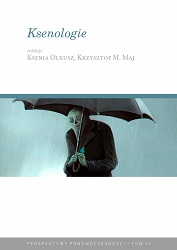"Méwilo" i "Freedom" Muriel Tramis jako pierwsze gry postkolonialne
Muriel Tramis’ "Méwilo" and "Freedom" as the First Postcolonial Games
Author(s): Filip Jankowski
Subject(s): Philosophy, Fine Arts / Performing Arts, Visual Arts, Social Philosophy
Published by: Ośrodek Badawczy Facta Ficta
Keywords: postcolonialism;slavery;Muriel Tramis;Patrick Chamoiseau;digital games; video games;Martinique;French Antilles
Summary/Abstract: In the chapter entitled “Muriel Tramis’ »Méwilo« and »Freedom« as the First Postcolonial Games, Filip Jankowski examines two digital games accomplished by Muriel Tramis, a game designer from Martinique. The games picture the situation of African-Caribbean slaves and their descendants in a pioneering manner in terms of the medium used. “Méwilo” (1987) and “Fredom” (1988) were created under the influence of the philosophical thought in Martinique, shaped by the pioneers of postcolonialism such as Aimé Césaire and Frantz Fanon, as well as their critics impersonated by Édouard Glissant and Patrick Chamoiseau. Both games differ in terms of applied convention. “Méwilo”, which is a thorough documentary game, focuses on questioning the following inhabitants of the city of Saint-Pierre, the day before the devastating eruption of the Montagne Pelée volcano in 1902. The opposition between the black inhabitants of Martinique and their metropolitan torturers, although strongly outlined, is subject to problematization in both games. Among the main characters of the Tramis' works are black anti-heroes who imitate the French in their ambivalent attitude to the African-Caribbean community. Hence, they reflect the phenomenon of mimicry described by Homi Bhabha. All things considered, Jankowski argues both games to feature apparent postcolonial themes.
Book: Ksenologie
- Page Range: 473-485
- Page Count: 13
- Publication Year: 2018
- Language: Polish
- Content File-PDF

